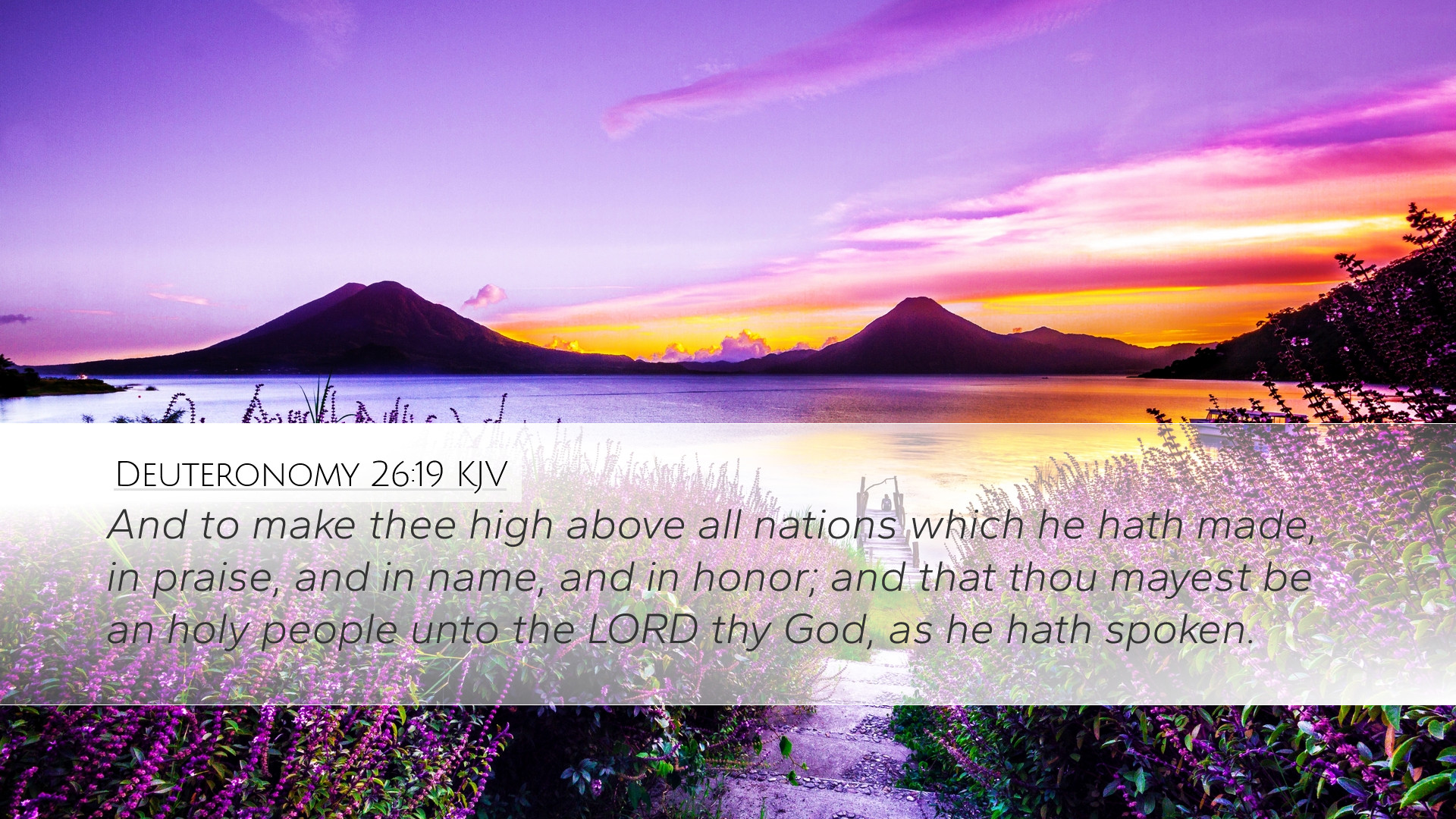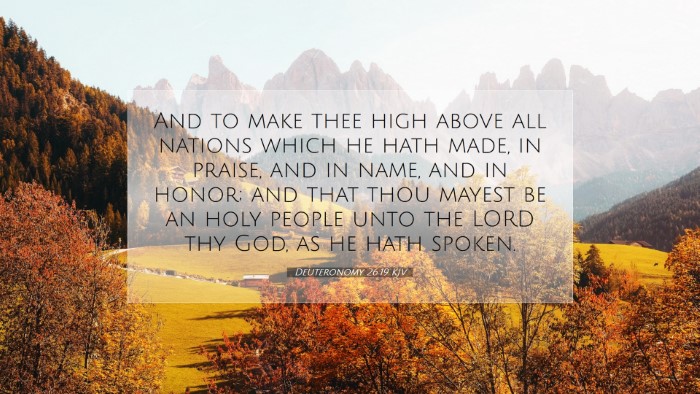Commentary on Deuteronomy 26:19
Verse: "And to make you high above all nations which he hath made, in praise, and in name, and in honour: and that thou mayest be a holy people unto the Lord thy God, as he hath spoken."
Introduction
The verse under consideration occupies a crucial place within the framework of Israel's covenant relationship with God. It encapsulates the promises made by God to Israel, a people chosen for His own possession, and outlines the intended outcome of that choice, namely to elevate them above all nations as a testimony of divine favor and holiness.
Insights from Commentaries
Matthew Henry's Commentary
Matthew Henry emphasizes the significance of God's promise to make Israel "high above all nations." This elevation is not merely a matter of national pride, but rather a reflection of God's sovereign choice and the resultant responsibility. Israel is chosen to reflect God's glory and righteousness, thus serving as a model of holy living to the surrounding Gentile nations.
- High Above All Nations: The "high" status signifies both a position of honor and the expectation of holiness. Israel's elevation is to showcase God’s greatness.
- Praise and Name: God’s intention is that Israel would not only receive honor but also be a channel through which His attributes are proclaimed throughout the earth.
- Holy People: Holiness is the cornerstone of Israel’s identity. Their distinctiveness lies in their relationship with God, which should manifest in their moral conduct and worship.
Albert Barnes' Notes on the Bible
Albert Barnes points out that this verse is packed with theological implications regarding Israel's purpose. The expressions "in praise," "in name," and "in honour" collectively signify that Israel is to be a testimony to God's character and works.
- Praise: Israel's life and practices are to elicit praise to God. Their obedience and faithfulness should serve as a beacon for others to recognize God's mighty acts.
- Name: The honor of God's name is at stake. Israel’s behavior reflects on God Himself; hence, they are called to live in a way that glorifies Him.
- Honor: As representatives of God on earth, the nation is to carry the weight of divine reputation, requiring a lifestyle marked by integrity and righteousness.
Adam Clarke's Commentary
Adam Clarke offers a perspective on the historical context of this promise, noting the key elements of God’s covenant with Israel. He stresses the necessity of obedience for Israel to realize the promised blessings.
- Conditional Nature: The promise of elevation is conditional upon Israel's fidelity to the covenant. Disobedience could forfeit these blessings.
- Testimony to Nations: Israel's aimed distinction is to signal to other nations the wisdom and understanding found in following Yahweh, a God who is near to those who call upon Him.
- Purpose of Holiness: Clarke highlights that holiness is not for isolation but for mission. Israel's separateness is meant to draw the nations towards God, presenting them as a community reflecting divine values.
Theological Implications
As we reflect upon Deuteronomy 26:19, several theological implications emerge:
- Covenantal Relationship: The verse highlights the importance of covenant fidelity. God's election of Israel is not arbitrary but deeply relational and demanding.
- Divine Purpose of Election: Their high status is initiated by God’s grace and serves a purpose that extends beyond themselves, aiming to bring glory to God and be a blessing to the nations.
- Call to Holiness: The call to be a "holy people" reiterates the idea that God’s people are set apart. This holiness reflects both a moral dimension and a mission-oriented approach to living.
Applications for Today
For pastors, students, theologians, and scholars, the implications of Deuteronomy 26:19 can be applied in various contemporary contexts:
- Identity of God’s People: Recognizing that believers today are also called to reflect the character of God in their communities.
- Mission and Witness: The importance of living out one’s faith in a way that draws others to God, with a focus on communal holiness as a testimony to the world.
- Understanding Blessings: Recognizing that blessings from God come with responsibilities; they are intended to reflect His glory and serve others.
Conclusion
Deuteronomy 26:19 reflects a profound truth about the nature of God’s relationship with His chosen people. The call to be "high above all nations" is a charge to live in such a way that God's greatness is acknowledged among the peoples of the earth. As we explore this scripture, we are reminded of our own covenantal responsibilities and the high call to holiness and witness.


